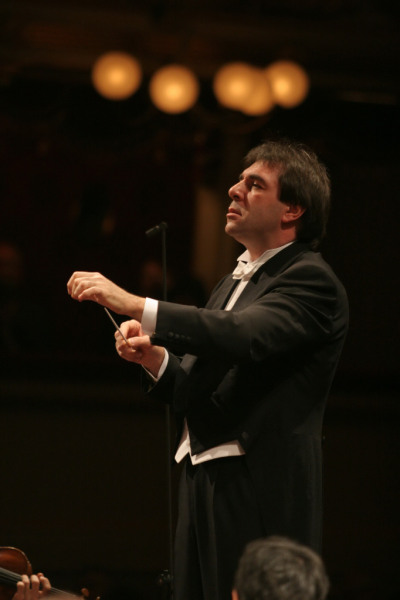Gatti closes New York season with more memorable Wagner, this time with Boston Symphony

Daniele Gatti conducted the Boston Symphony Orchestra in a Wagner program Friday night at Carnegie Hall.
Daniele Gatti’s triumphant New York season, which wrapped up Friday evening at Carnegie Hall, brings to mind something that A. Bartlett Giamatti wrote about baseball: that you always believe its joys and companionship will go on forever until suddenly it ends, leaving you to face the fall alone.
New Yorkers need to wait until early 2014 to hear Gatti again, but they will have plenty of happy musical memories to draw upon until then. Gatti’s conducting in the Metropolitan Opera’s new production of Richard Wagner’s Parsifal made silences fraught and uncanny and unleashed surges of roiling, pain-drenched sound.
On Thursday and Friday at Carnegie Hall, Gatti led the Boston Symphony Orchestra in Mahler’s Third Symphony, reviewed in Boston last week, and an all-Wagner evening honoring the composer’s bicentennial. Excerpts from Götterdämmerung: Dawn and Siegfried’s Rhine Journey and Siegfried’s Death and Funeral Music made up the first half of Friday’s program.
The concert’s opening moments summed up the particular brand of magic Gatti can bring in this repertoire: a barely audible shudder, a feathery caress from the cellos, the languid noodling of the winds, and listeners at once heard not only the coming of light but also the stirring of Brünnhilde and Siegfried after a night of love.
As he had in the Met Parsifal, Gatti crafted luxuriant layers of sound: when the sun’s first rays shone, the violins traced lustrous, swirls against the heaving orchestra; the double basses sang of darkness and menace even as the exultant Rhine motif rang out; and the strings trilled, tense and blindingly bright, as the memory of Brünnhilde bore through the dying Siegfried. Before the funeral music began, Gatti indulged in several of those trademark pauses that make you wonder whether he has suffered a memory lapse, then from the stillness drew pandemonium, filling the crashing chords at the selection’s climax with brittle, garish colors that undercut the music’s militaristic bluster.
The BSO’s quicksilver playing in the Tannhäuser Overture was a welcome reminder of Wagner’s massive debts to Felix Mendelssohn, about whom he wrote so many despicable things. The opening theme, beautifully shaded, unfolded stately and wholesome until the vortex of the Venusberg music arose, all spun sugar and fairy dust. The noisy, clattery bazaar of the overture’s closing pages was magic, with the strings slithering and lapping against the solemn blaze of the BSO’s awe-inspiring brass section. The gaudy afterglow summoned by Gatti suggested that the minnesinger’s earthly passions had the upper hand over his spiritual aspirations.
The juxtaposition of Kundry’s narrative from Act II of Parsifal with music from Lohengrin allowed listeners to ponder one of Wagner’s great mysteries: that Parsifal’s chastity and repudiation of desire, as Friedrich Nietzsche wickedly observed, by some miracle brings about Lohengrin’s birth. Michelle DeYoung sang Kundry’s music without great finesse but with admirable generosity, and the BSO under Gatti purred a velvety, Oedipal lullaby, with the repeating chords marking Herzeleide’s grief sounding from afar, as if from a lingering nightmare.
In the Lohengrin Prelude the BSO’s violinists surpassed themselves, playing with a searingly intense brightness that told of enchantments too wondrous to last, already shot through with the pain of their loss. The cymbal crashes that mark the Grail’s descent were surprisingly soft, almost as if the holy vessel had begun to recede before it manifested.
Despite a tumultuous ovation at concert’s end, Gatti and the BSO granted no encores, a decision that might seemed churlish at the time but right upon further reflection given the concert’s final offering: the Prelude and Liebestod from Tristan und Isolde. It was a performance of cruel and perfidious beauty: the quizzical opening phrases were downy-soft and beckoning, beguilingly sweet. The woodwinds whimpered with fatigue; the low strings sounded like bruises; the double basses’ pizzicati were nothing more than slightly darker shades of silence. DeYoung sang with euphoric abandon, and the rhythms were those of the Weltatem, the world-breath.
What encore could follow that? Giamatti’s essay ends with a lament for things that don’t last forever, but music-making at this level, though utterly and cruelly evanescent, leaves listeners with an indelible joy.
The Boston Symphony Orchestra’s 2014 series at Carnegie Hall includes music by Brahms, Ravel, Schumann, and Stucky under the direction of Bernard Haitink, while Daniele Gatti returns to lead the Vienna Philharmonic Orchestra in works by Berg, Mahler, and Schubert. Tickets and information: carnegiehall.org or 212-247-7800.